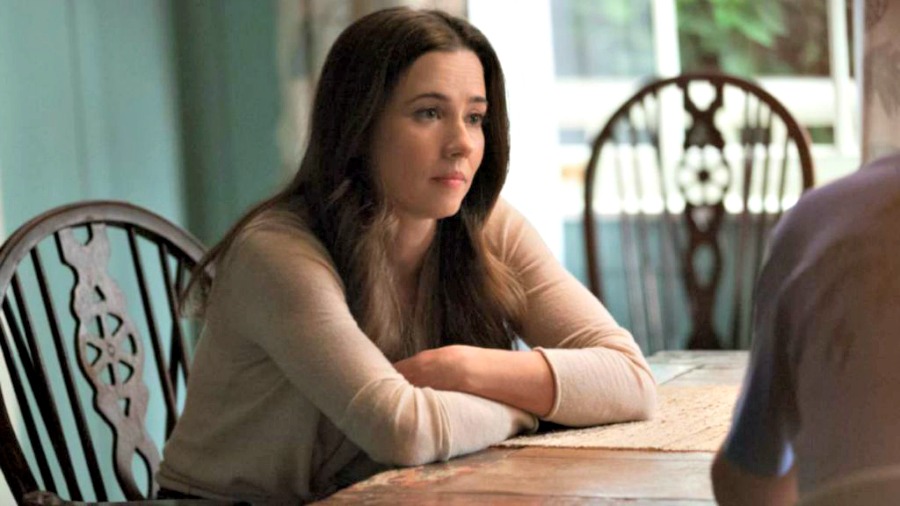The index to the entire Joss Whedon roundtable is here.
_________
The most jaw-dropping moment in the lastest installment of the Avengers franchise, The Age of Ultron, was not a fight sequence or a CGI robot or even the relvelation about those creeepy twins. It was the discovery that Hawkeye/Clint Barton (played by Jeremy Renner) had a family. While the other Avengers made clumsy romantic overtures toward each other—particularly The Hulk/Bruce Banner (Mark Ruffalo) and Black Widow/Natasha Romanoff (Scarlett Johansson)—Hawkeye had been presiding over an ubertraditional domestic scenario in his other secret life, complete with two towheaded kids and a pregnant wife, Laura Barton, her countenance alternately radiating farmfed good health and requisite worry (the longsuffering Linda Cardellini).
Though the scenes at the Barton homestead are certainly meant to provide peaceful and occasionally comic intervals between the Avengers lengthy and elaborate battles to save the world, they feel tacked on, inauthentic. What I suspect Whedon was attempting with the deepening of Hawkeye’s character was to make him more interesting (since, let’s face it, his powers are sort of underwhelming) and to add another dimension to the franchise. It’s an age old saw that superheroes can’t have so-called normal relationships; the friction between their everyday lives and their secret identities simply do not allow for it. Getting involved with normals—usually women, since most superheroes are men—can compromise their vocation and make them vulnerable on too many fronts. Thus Hawkeye’s family had been kept secret from the Avengers, so that neither friend nor enemy could put them in danger.
This vision of radical solitude, of permanent singlehood, could be seen as progressive: the hero, fighting always for the greater good, is unencumbered by the domestic relationships and mundane activities that traditionally bind people together. Yet even in his early days, Whedon never took that stance. The Avengers, after all, are a mock family of sorts, and in that they are a natural progression from the Scooby gang of Buffy the Vampire Slayer. Though the gang coalesced around Buffy and her superpowers, by the end of the series nearly every member of the group had some sort of power, an identity he or she had to hide from the world at large (though Xander’s occasional military knowledge, a residue left in his brain after a Halloween episode where he transformed into a mercenary, was always a little suspect).
Over the seven seasons of Buffy, we watched her struggle with The Big Bad, with her powers, with her vocation, and with her family and friends. We also watched Buffy, Willow, Xander, and Giles take on and lose several romantic relationships. Though the first few seasons of the series relied on Buffy’s ill-fated romance with the vampire Angel as an analogy of adolescent relationships, the transformation of Angel into a good vampire eliminated much of the tension that fueled their attraction. Buffy’s subsequent relationships, with the buff-but-boring Riley (who turned out to be involved in a nefarious proto-military project), and then with the reluctantly reformed vampire Spike never quite reached the intensity of feeling of that first time with Angel. When the Spike attraction began it was clearly for a bad boy, and definitely had Buffy dealing with the complications of sexual attraction for someone she really didn’t like or trust. It dovetailed quite nicely with her feelings of alienation upon being brought back to life by her friends; exiled, as it turned out, from a place more like heaven than hell.
The other romances we watched play out on Buffy ranged from poignant to the stuff of romantic comedy. Willow’s high school boyfriend Oz, who conveniently turned out to be a werewolf, joined the group without too much hazing. It was rougher when she fell in love with Tara, not only because Tara was a woman but because she was a witch, and the couple’s dabbling in dark magic went from a hobby to a dangerous obsession. Xander’s only real girlfriend after years of an unrequited crush on Buffy, the former vengeance demon Anya, had a harder time assimilating into the Gang, in part because of her rather abrasive personality. And after his girlfriend, a computer teacher at Sunnydale High with gypsy roots, is killed fairly early in the series, we don’t see token adult/sometime watcher/school librarian Giles do very much socializing. In fact, when he leaves to return to his native England it feels appropriate, like he should really stop being an old guy hanging around with a bunch of college kids.
The solidification of the Scooby Gang as a proto-family reached its apotheosis with the arrival of Dawn, Buffy’s younger sister, who suddenly appeared on the show several seasons into its run. What began as a WTF moment slowly unfolded into one of the most complicated relationships on the show, as everyone became protective of Dawn but Buffy retained the resentment that older siblings generally have for younger ones. Don’t touch my stuff. Stop hanging out with my friends. GO AWAY!
Among Buffy stalwarts it’s generally agreed that the scariest episode of the show has nothing to do with the supernatural, and everything to do with domestic life. In “The Body,” Buffy comes home to find her mother, Joyce, is dead. Her death, sudden but of natural causes, cannot be undone by any spells. No magic, no books, no wishes will bring back her mother. In facing the abyss of grief, Buffy, who has already seen so much death, is forced to deal with the most mundane aspects of life: taking care of her sister, getting a job, housekeeping, and muddling through without the person who had always quietly been there for her, even when they had the usual (and unusual, since she is a Slayer) mother-daughter disagreements.
In the final season of Buffy, for reasons too complicated to get into, the Scooby Gang has to mobilize once again to save the world but this time they have another agenda: they must protect all of the potential slayers (the brief backstory here is that when the Slayer dies, a new one is called). Thus Buffy and the Scoobys end up running a kind of a training camp for adolescent girls, many of whom resemble Buffy was before she was annointed: bratty, selfish, mopey, whiny, and scared. It would be an overstatement to claim that in raising up her army Buffy takes on a maternal role, but she does take on the persona of mentor and leader.
And it’s this final incarnation of the Gang, which is a family bound by something stronger than blood and far less sentimental than traditional domesticity, which fights the ultimate battle of Buffy. It is much more satisfying, and progressive than anything Whedon has come up with since: an army of adolescent girls, led by an extraordinary young woman and her friends, who have gradually grown up together and discovered their own distinct powers, bestowed on them in part by fickle gods, but mastered largely through their own maturation and machinations. It is more thrilling, dangerous, and emotionally charged than any Avengers battle could ever be.


